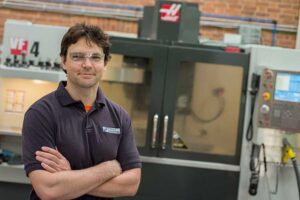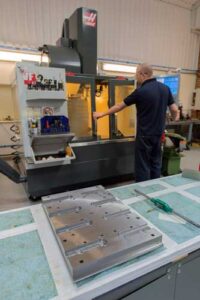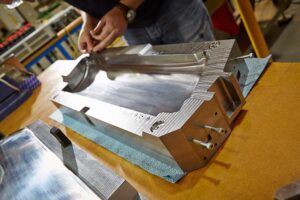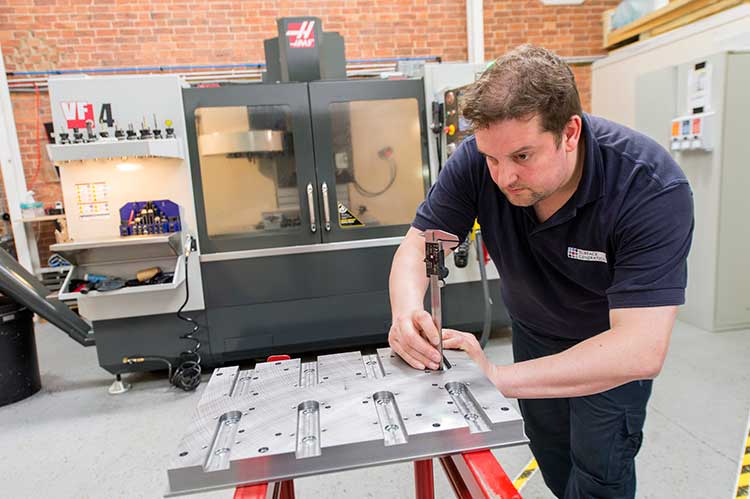If you’re going to change the way things are made, you need very good ideas and pertinacious investors. When Ben Halford founded Surface Generation in 2000 as a spin-off from an engineering consultancy business, he had both. Which is just as well because a few years into its business plan, Surface Generation’s future hung in the balance.
“The financial crisis of 2007/8 hit us hard,” says Mr. Halford. “But, with the support of our shareholders we got our heads down and developed something in which we’d seen a nascent interest: a rapid heating and cooling technology for composites parts production. And that’s what we have today.” The technology found a market immediately and the company’s operations grew dramatically. “We now have 30 people employed here and we are working hard to keep up with demand from some very well known firms around the world.”

Surface Generation claims its patented Production to Functional Specification (PtFS) technology provides manufacturers in the aerospace, automotive and consumer electronics sectors with a significant improvement in cost, quality and delivery for precision moulded parts.
“Most composite parts are ‘cooked’ – heat cured, in an autoclave,” says Mr. Halford. “But that’s an isothermal process, where the temperature the part is exposed to is constant. If you want to make parts of varying sectional thickness, perhaps using a combination of different materials, it can’t be done in an autoclave, as different areas of the part need to be heated to different temperatures and cooled at different rates.”
The secret behind the success of PtFS is how it uses a custom designed chequer board configuration, where each square on a mould tool is heated and cooled individually, with pressurised air, controlled by a computer. All types of materials can be processed, up to 850°C, including thermosets, thermoplastics, metals and glass.
Surface Generation has quickly built a reputation for engineering solutions when, according to Mr. Halford, a customer reaches an impasse because no other processes appear to be working. ‘Torture parts’, as he calls challenging projects, are normal, every day problems. “These are components where the general consensus is that they can’t be manufactured.

“For example, last year we were given a part to make, which incorporated a logo that wasn’t mouldable using typical processes. But, I’m happy to say we solved the problem with 100% yield. In another case, we’ve taken a cycle time down dramatically from 2 hours to just 20 minutes. Our process delivers that kind of very significant difference.”
Surface Generation’s success is also down to solid investment decisions such as, for example, the latest CAE technologies, including SolidWorks and PowerMill. The company has also acquired three US designed and built Haas VF CNC vertical machining centres from UK distributor, Haas Automation UK, Ltd. The VF-3 machining centre, with WIPS (Wireless Intuitive Programming System) arrived first, in 2012, followed by a Haas VF-2SS super speed around 18 months ago and, most recently, a Haas VF-4.
“Previously, we were subcontracting parts to job shops, which just didn’t give us the necessary control, quality or flexibility,” says Mr. Halford. “However, this was addressed immediately with the arrival of the VF-3. We looked carefully at two or three other brands of CNC machine tools, but liked what Haas were doing. Haas UK had an extremely good engineering and support team, which also gave us a great deal of confidence.”
A normal mould base at Surface Generation comprises around 200 hours of machining, and among the main challenges is the production of deep pockets in confined spaces. Here, the through-coolant capability of the VF-4 helps enormously. Another challenge ably accommodated by the Haas machines is shear edge details on compression moulds. The company maintains a gap of between 25 and 50 µm on a compound surface while trying to follow what it describes as “a nasty contour”.

Surface Generation selected the Haas VF-3 as it was the smallest model of Haas vertical machining centre available on that particular size of base casting, which Mr. Halford felt was a good indicator of rigidity.
“We’re cutting mostly hard metals,” he says. “The VF-3 has proved to be a rock solid performer. The VF-2SS is quick, and the VF-4 has been a great all-round machine, as well.
“Another good thing is that pretty much anyone can use a Haas with a days’ training. All the controls are the same, irrespective of machine size. Also, I should mention that availability from Haas UK is brilliant! We bought the VF-4 as we were behind on a big project. I made a phone call to Haas and the machine was installed within seven days – I can’t imagine that would be possible anywhere else!”
As well as normal day shift, Surface Generation runs its Haas machines lights out through the night and at the weekends, making parts typically from steel, but also from materials such as Invar and titanium.
“Our Haas machines are very reliable. We leave all three running on a Friday night, and they will probably still be running on Sunday. This is how we’ve geared up our business.”
From those difficult days in the aftermath of the global financial crisis, Surface Generation has successfully reinvented itself. The company has recently secured a further £3.1 million of investor funding to help maintain its rapid development – revenue in 2014-15 was £2 million, a staggering 233% rise on the previous year! “Nobody else is really doing what we do,” says Mr. Halford. “We’re attracting the attention of some big name manufacturers, so we’re definitely going to need more space and, of course, as our overseas businesses in the US, Taiwan and Japan bring in more orders, we’ll also need more Haas CNC machine tools.”


